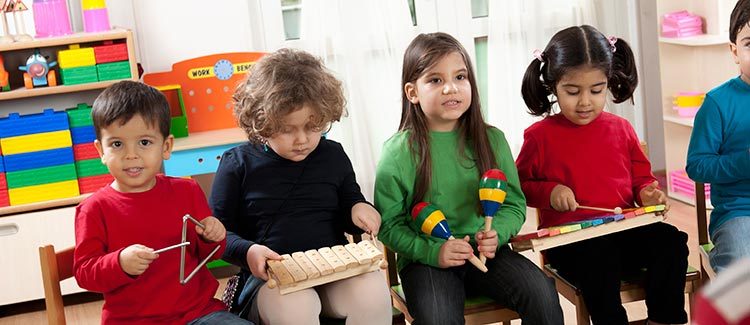Does your preschooler have a full schedule? What’s the right type and amount of extracurricular activity?
Some preschoolers are happiest with schedules full to the brim with planned activities, while others may need more time for imaginary play or just watching butterflies. Though many children have the stamina for activities outside of preschool, you’ll want to allow for learning through downtime at home or spontaneous play in the neighborhood. Consider how many extracurricular activities per week you should schedule that will satisfy natural interests and support learning without exhausting or overwhelming your preschool-age child.
Types of activities
Start with your child’s interests. Does she like to dance or sing? A preschool music class might engage her, But depending on her temperament and openness to new experiences, extracurricular classes can be an opportunity to introduce her to new types of activities. For a child who is shy or slow to warm to new situations, consider signing her up with a friend to ease the transition to a new activity.
“Get as many recommendations as possible and find out if you can sit in one time before committing yourselves. I think it’s pretty easy to get a feel for the place,” advises Lauren Wohl-Sanchez, a mother of two in Oakland, Calif.
Music
Music classes are appropriate for very young children, even before starting preschool. They are generally facilitated by a teacher/musician who plays an instrument and encourages students to sing or play along with kid-safe instruments. It’s an opportunity to help active youngsters learn about sitting in a circle and participating in a group while listening to music. Some children participate simply by observing. Others feel comfortable banging on drums or belting out songs with their peers.
Sports
A basic sports or movement class helps little ones move their bodies and build coordination. Some sports programs are devoted to more serious skill building. It’s a good idea to check whether the class will be devoted to skill-building games or more-unstructured play using sports-related equipment. Classes that focus on games with instructions, teams and rules may frustrate younger preschoolers who are not yet able to follow along. Rae Pica, an author and children’s physical activity specialist in Center Barnstead, N.H., cautions, “Children start life with a love of movement. We don’t want to squash that by enrolling them in activities when they aren’t developmentally ready. If parents notice other preschoolers doing a skill that their children aren’t yet, don’t worry. They’ll do it when they are ready and catch up to their peers quickly.”
Dance
Dance is another activity that can start at a young age. Besides ballet, modern and tap, there are classes in more-ethnic dance styles, such as Indian, urban dance or hip-hop. In addition to building strong muscles and coordination skills, dance may satisfy young children’s interest in dramatic play by allowing them to use props and have performances. And by no means is dance just for girls, as more boys are participating in these classes.
Art
If you’re looking for an activity to build fine motor skills and inspire creativity, consider an art class. These courses provide the supplies for either a free-choice art experience or a specific type of art, for example, ceramics or painting. No matter the type of instruction, art classes support the development of fine motor skills through holding and using a marker, molding clay or leaning to sew. And for kids who enjoy sensory experiences, there’s plenty of opportunity for messy, hands-on projects, which parents will appreciate occurring in the classroom rather than at home.
What is the educational value?
If kids are rested and able to focus on the activity, then learning occurs in several ways.
In a group setting, kids learn about working with others. They listen and watch how other children problem-solve. Any extracurricular activity will involve using the body and practicing motor skills, whether it’s a big movement such as jump-roping or a smaller one like beading a necklace. Catching a ball or listening to a guitar will trigger new connections in brain development.
Overscheduling
How much learning happens if preschool-age children are tired? And why the hurry to start classes and develop skills at such a young age? Parents are often eager to start their kids in activities to get a leg up on developing skills. Pica notes, “Often parents sign up their preschoolers for too many activities. I suggest one at a time.”
Looking back on her daughter’s experience outside of preschool, Wohl-Sanchez adds, “It was much more important to me that she was having fun, getting exercise and making friends at that age than learning a new skill that she’d stick with.”
Besides the potential exhaustion of overscheduled preschoolers, parents and caregivers should consider the logistics and expenses of driving to and paying for these classes. Once kids are enrolled in elementary school, scheduling becomes more complicated with homework, playdates, band, sports or tutoring. So the preschool years are a good opportunity to allow children to enjoy unscheduled time too.
The playgroup as an alternative
One way to have social interactions with other kids and participate in more unstructured, spontaneous play is through a playgroup. Weekly playdates, held at alternating houses or a local park, give young children the same opportunities to stretch their legs, work with others and have fun. Depending on the setting, they can be geared to a specific type of play — sports, music or art — or truly spontaneous and left up to the kids to decide what to do.
Playgroups give parents opportunities to socialize and compare notes on the many questions that come up when raising preschoolers, including how and where to find quality extracurricular activities for their children when they are ready.





